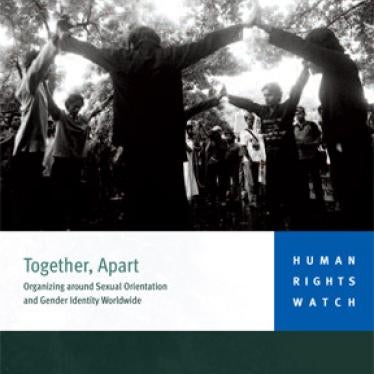In response to a global advocacy campaign led by Human Rights Watch, the UN General Assembly held a rare revote on a resolution protecting people from extrajudicial killings. Human Rights Watch played an important role in the global advocacy that led to an overwhelming majority vote in favor of granting the same protections to lesbian, gay, bisexual, and transgender (LGBT) people as to all others whose lives are threatened.
The provision on sexual orientation was first added to the UN resolution on extrajudicial killings in 1999 at the insistence of the UN Special Rapporteur on Torture, whose findings evidenced the link between homophobia, perceived sexual orientation, and fatal hate crimes in a number of places around the world. During a November 2010 meeting of the UN committee that oversees decisions on human rights, that part of the resolution was removed. The initiative for the provision’s removal was spearheaded, ostensibly for religious and cultural reasons, by some members of the Organization of the Islamic Conference and of the United Nation’s African Regional Group, including Uganda, South Africa, and Rwanda.
Boris Dittrich, Human Rights Watch’s LGBT rights advocacy director, quickly realized that a UN event he was co-organizing to celebrate International Human Rights Day on December 10 could be used as a catalyst to prompt a revote. UN Secretary-General Ban Ki-moon and US Ambassador to the United Nations Susan Rice were invited, and both accepted. Ban opened the session by calling for an end to laws that criminalize consenting homosexual conduct. Rice, during her keynote speech, announced that the United States sought to reopen the debate on the controversial amendment at a meeting of the UN General Assembly just 11 days later.
In the intervening period, Human Rights Watch got to work, mounting a powerful campaign to swing a majority in favor of undoing the homophobic amendment.
Human Rights Watch’s South Africa director, Sipho Mthathi, ramped up pressure on the government in Pretoria, while reaching out to South African LGBT rights groups urging them to do the same. Boris Dittrich made a prominent media appearance on South African television in which he questioned South Africa’s stance on the amendment. South Africa, which has quite robust protections for the LGBT community in its constitution, had voted in favor of the amendment that would remove protections for LGBT people.
Meanwhile, Philippe Bolopion, Human Rights Watch’s UN advocacy director, and Boris Dittrich contacted as many diplomats ahead of the reopened debate as possible. This outreach helped secure fresh support from many countries, including a block of seven countries in the Caribbean Community (Caricom). Following meetings with UN mission diplomats from Colombia and Suriname, Boris reached out to mobilize LGBT human rights activists in these countries, encouraging them to challenge their country’s vote on the amendment. Ultimately, both of these countries changed their vote, as did South Africa.
During the final vote by the General Assembly, the UN ambassador from Rwanda made a strong statement in favor of undoing the homophobic amendment. Together with cooperation from Argentina, Belgium, Brazil, France, the Netherlands, Norway, and Gabon, our efforts led to an overwhelming majority of 94 countries in favor of restoring the resolution to ensure that LGBT people would continue to be protected.






